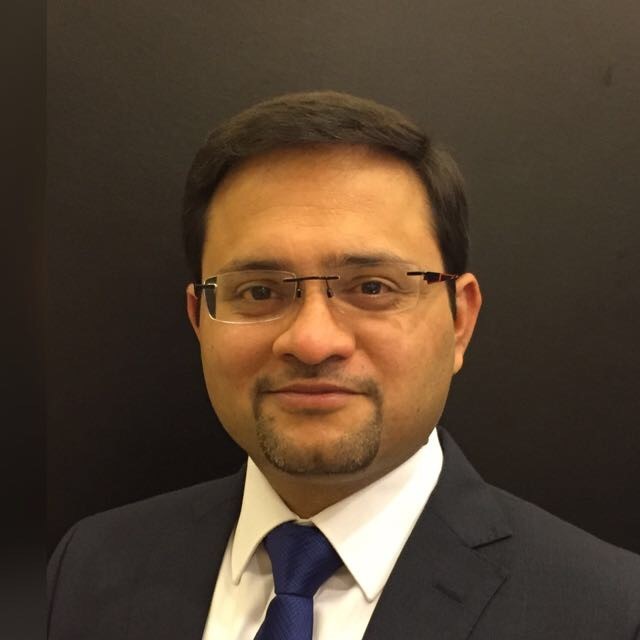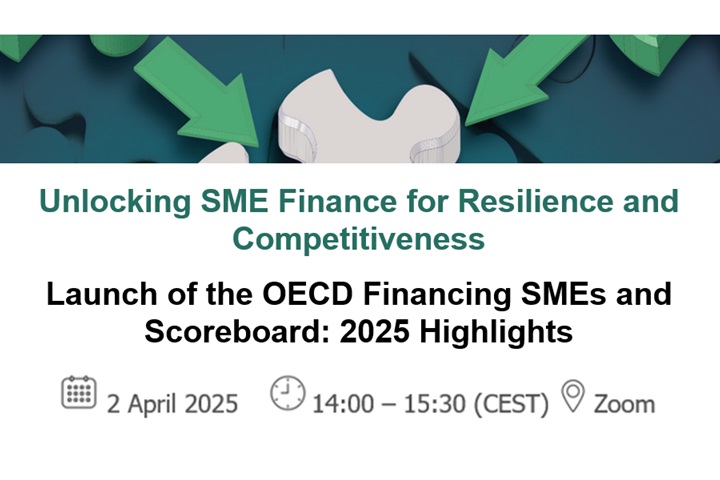Our events
Risk Management Community of Practice (CoP) - 2022 Meeting. From Judgment to Scorecard – Key First Steps
23 February 2022
Time:
to
EDT
( GMT
)
13 : 00
14 : 30
-04:00
Convert
-04:00
Online

The Risk Management Community of Practice (CoP) is a Member-Only event and it aims to bring together professionals and risk management experts from member institutions of the SME Finance Forum to share their learning, experiences, and good practices examples with their peers. The scale and complexity of financial institutions and the pace of their financial transactions demand that they employ sophisticated risk management techniques and monitor rapidly changing risk exposures. At the same time, advances in IT innovation and solutions have lowered the cost of acquiring, managing and analyzing data, and have enabled considerable and ongoing advances in risk management at leading institutions. Financial institutions in emerging market countries are also increasing their focus on risk management in order to build more robust and sound financial systems, to remedy weaknesses that were exposed by the recent crisis.
The CoP collaborates through
• On-going email and LinkedIn group (this will be a closed member only group) exchanges among CoP members;
• A series of virtual meetings (WebEx) among members of CoP;
• Sharing and discussing specific case studies shared by both members and non-members;
• Exchanging relevant studies, articles and other publications on the topics;
• Where possible, participate in study visits to “good practice” institutions to learn from first hand experiences.
Who should participate in the CoP
• Senior executives working on or responsible for risk management or relevant areas from member institutions of the SME Finance Forum
Upcoming CoP Meeting
From Judgment to Scorecard – Key First Steps!
Effective credit risk management requires financial institutions to evaluate the characteristics of both the borrower and the loan to understand the probability of default and to calculate the expected loss. Characteristics of the borrower could include character, capacity, capital, while loan characteristics could factor in conditions and collateral among others. These data points are ultimately the key inputs to the overall credit assessment and credit classification. Credit classification can take many forms and evolve with the capacity of the financial institution, ranging from pure judgment, a “template” of guidelines, scorecard to a pure model. In our next meeting, we will examine the challenges and opportunities faced by financial intuitions when transitioning from an opinion-based, case-by-case evaluation of credit risk to the systematic application of the standardized scorecard across all sectors.
Join this meeting on February 23rd at 8 AM EST to learn and discuss:
- What are the drawbacks of using pure judgment or a structured “template” of guidelines in evaluating credit risk?
- What are the challenges with transitioning from using pure judgment or a structured “template” of guidelines to a scorecard?
- How to develop a rating scale for credit risk assessment? Specifically, how many ratings should be included, what does a rating mean, and what credits does a scale apply to?
- How are ratings assigned and who assigns them? What tools are used?
- How to calibrate the scorecard? How are the ratings linked to the probability of default? What data are required to calibrate? Who is responsible for the analysis?
CoP Chair: Rajeev Chalisgaonkar, Global Head of Business Banking, Standard Chartered Bank
Speakers
 Aditya Sharma is the Head Global Credit Risk, Business Banking at Standard Chartered. Aditya is an experienced SME and commercial banker with over 20 years of experience and is currently Global Head of the Business Banking Risk in Standard Chartered Bank responsible for managing credit risk in Asia and Africa markets and is based in Singapore. In his earlier assignments in Standard Chartered Bank as Head of Global Working Capital and Trade products for business Banking, Aditya successfully rolled out trade and working capital solutions using simple rule-based products to ease lending to SMEs in Asia and Africa. As part of Regional Commercial Banking team, based in Dubai in earlier roles, Aditya has worked extensively to drive SME business in Middle eastern markets and worked with guarantee agencies and local govt bodies to increase access to SME financing. In his years spent in India in SME product management, he has hands on experience in managing different SME products to expand SME lending. As Head of Commercial Branch, he also has a very close understanding of transacting and servicing needs of SMEs in emerging markets. In his current role, Aditya is actively engaged in repurposing the SME business and risk management business with the help of alternate data and digital tools in partnerships with Fintechs to expand the reach and access to micro SME segments which historically were out of reach under traditional Banking for most of Banks. Under his leadership Bank has undertaken several initiatives across markets to automate and digitise SME lending. Aditya holds an MBA from Mumbai, India and his interests include travelling, reading and playing piano.
Aditya Sharma is the Head Global Credit Risk, Business Banking at Standard Chartered. Aditya is an experienced SME and commercial banker with over 20 years of experience and is currently Global Head of the Business Banking Risk in Standard Chartered Bank responsible for managing credit risk in Asia and Africa markets and is based in Singapore. In his earlier assignments in Standard Chartered Bank as Head of Global Working Capital and Trade products for business Banking, Aditya successfully rolled out trade and working capital solutions using simple rule-based products to ease lending to SMEs in Asia and Africa. As part of Regional Commercial Banking team, based in Dubai in earlier roles, Aditya has worked extensively to drive SME business in Middle eastern markets and worked with guarantee agencies and local govt bodies to increase access to SME financing. In his years spent in India in SME product management, he has hands on experience in managing different SME products to expand SME lending. As Head of Commercial Branch, he also has a very close understanding of transacting and servicing needs of SMEs in emerging markets. In his current role, Aditya is actively engaged in repurposing the SME business and risk management business with the help of alternate data and digital tools in partnerships with Fintechs to expand the reach and access to micro SME segments which historically were out of reach under traditional Banking for most of Banks. Under his leadership Bank has undertaken several initiatives across markets to automate and digitise SME lending. Aditya holds an MBA from Mumbai, India and his interests include travelling, reading and playing piano.  Steven Bennett has over 25 years’ senior executive experience developing a range of international financial services businesses across developed and emerging markets in Asia, Europe and North America. He has worked in Singapore, The Philippines, Hong Kong, USA, UK, Georgia and Lao PDR and held national, regional and global roles at HSBC, National Australia Bank and Turkish Bank UK. Through these has developed a broad range of expertise and delivered results across Commercial, Transaction and Retail Banking, HR, IT, Operations and as a country CEO in two markets (one developed, one emerging), including one start-up. His commercial experience is supported by extensive functional expertise in strategy development and execution, product and channel management, customer service enhancement, enterprise-wide risk management uplift, credit and financial crime compliance frameworks, corporate governance, regulatory engagement (in 3 jurisdictions), restructuring and digital transformation programmes. At Phongsavanh Bank, Steven is responsible for overseeing the Retail, SME and Corporate businesses, Marketing, the Branch Network and digital services. About Phongsavanh Bank. Phongsavanh Bank (PSVB) is the leading private bank in Lao PDR, providing a comprehensive range of financial services to over 350,000 retail, SME, corporate and institutional customers through over 45 branches and an extensive ATM network. Established in 2007, PSVB aspires to be the Bank of First Choice, supporting our customers, fostering financial inclusion and contributing to the development of a robust, trusted and internationally aligned financial services sector in Lao PDR.
Steven Bennett has over 25 years’ senior executive experience developing a range of international financial services businesses across developed and emerging markets in Asia, Europe and North America. He has worked in Singapore, The Philippines, Hong Kong, USA, UK, Georgia and Lao PDR and held national, regional and global roles at HSBC, National Australia Bank and Turkish Bank UK. Through these has developed a broad range of expertise and delivered results across Commercial, Transaction and Retail Banking, HR, IT, Operations and as a country CEO in two markets (one developed, one emerging), including one start-up. His commercial experience is supported by extensive functional expertise in strategy development and execution, product and channel management, customer service enhancement, enterprise-wide risk management uplift, credit and financial crime compliance frameworks, corporate governance, regulatory engagement (in 3 jurisdictions), restructuring and digital transformation programmes. At Phongsavanh Bank, Steven is responsible for overseeing the Retail, SME and Corporate businesses, Marketing, the Branch Network and digital services. About Phongsavanh Bank. Phongsavanh Bank (PSVB) is the leading private bank in Lao PDR, providing a comprehensive range of financial services to over 350,000 retail, SME, corporate and institutional customers through over 45 branches and an extensive ATM network. Established in 2007, PSVB aspires to be the Bank of First Choice, supporting our customers, fostering financial inclusion and contributing to the development of a robust, trusted and internationally aligned financial services sector in Lao PDR.  Ligia Castro-Monge is the Credit Risk and Scoring Lead for Finca Impact Finance, a network of 19 banks and microfinance institutions that provides responsible financial services to more than 2.6 million low-income customers across the world and consistently delivers a double-bottom line of financial and social performance. Ligia has more than 35 years of professional experience in the economic and financial fields, 20 of which have been dedicated to promoting and implementing better risk management practices in the financial inclusion industry. Before joining Finca Impact Finance, Ligia provided consulting services to numerous international organizations (ADA, IADB, Oikocredit), and technical assistance, training and coaching in financial and non-financial risks management under the Basel II and Basel III guidelines to financial inclusion service providers in Latin America and the Caribbean, Sub-Saharan Africa, East Asia and the Pacific, the Middle East and North Africa, and Europe. Since joining Finca Impact Finance in 2018, Ligia has supported the strengthening of control and oversight capacities of Risk Departments at subsidiaries in Latin America and the Caribbean and Eurasia, and more recently has been transferred to the Operations Department to lead the development and monitoring of cost-effective data-driven credit decisioning tools for repeat and new customers; building dynamic reporting mechanisms for loan portfolio quality monitoring, and contribute to the consolidation of a sound credit risk management environment. Ligia holds university degrees in Economics from the University of Costa Rica (Baccalaurate), and a Master of Arts Degree in Economics from The University of Chicago, Illinois, U.S.A.
Ligia Castro-Monge is the Credit Risk and Scoring Lead for Finca Impact Finance, a network of 19 banks and microfinance institutions that provides responsible financial services to more than 2.6 million low-income customers across the world and consistently delivers a double-bottom line of financial and social performance. Ligia has more than 35 years of professional experience in the economic and financial fields, 20 of which have been dedicated to promoting and implementing better risk management practices in the financial inclusion industry. Before joining Finca Impact Finance, Ligia provided consulting services to numerous international organizations (ADA, IADB, Oikocredit), and technical assistance, training and coaching in financial and non-financial risks management under the Basel II and Basel III guidelines to financial inclusion service providers in Latin America and the Caribbean, Sub-Saharan Africa, East Asia and the Pacific, the Middle East and North Africa, and Europe. Since joining Finca Impact Finance in 2018, Ligia has supported the strengthening of control and oversight capacities of Risk Departments at subsidiaries in Latin America and the Caribbean and Eurasia, and more recently has been transferred to the Operations Department to lead the development and monitoring of cost-effective data-driven credit decisioning tools for repeat and new customers; building dynamic reporting mechanisms for loan portfolio quality monitoring, and contribute to the consolidation of a sound credit risk management environment. Ligia holds university degrees in Economics from the University of Costa Rica (Baccalaurate), and a Master of Arts Degree in Economics from The University of Chicago, Illinois, U.S.A. David Snyder has over thirty years of experience analyzing and managing risk. His full-time job involves evaluating the quality of credit risk management across Consumer and SME lines of business at one of the largest financial institutions in the United States. Additionally, he is pursuing doctoral research with City, University of London and collaborating with SME Finance Forum on a global study to determine key success factors for use of credit scoring for MSME lending. David has completed MBA, MSF and MPH in Epidemiology degrees. He lives with his family near San Francisco, California.
David Snyder has over thirty years of experience analyzing and managing risk. His full-time job involves evaluating the quality of credit risk management across Consumer and SME lines of business at one of the largest financial institutions in the United States. Additionally, he is pursuing doctoral research with City, University of London and collaborating with SME Finance Forum on a global study to determine key success factors for use of credit scoring for MSME lending. David has completed MBA, MSF and MPH in Epidemiology degrees. He lives with his family near San Francisco, California.  Dmitry Borodin is theHead of Products and Decision Analytics at CreditInfo. has participated in numerous SME scorecard development projects. He has developed scorecards for banking, MFI and credit bureau sectors. Dmitry has experience with models designed for managing credit risks, optimization of collections processes, identification of propensity to new credit and anti-fraud solutions. Dmitry as well delivered scorecard related trainings, workshops and presentations.
Dmitry Borodin is theHead of Products and Decision Analytics at CreditInfo. has participated in numerous SME scorecard development projects. He has developed scorecards for banking, MFI and credit bureau sectors. Dmitry has experience with models designed for managing credit risks, optimization of collections processes, identification of propensity to new credit and anti-fraud solutions. Dmitry as well delivered scorecard related trainings, workshops and presentations. Robert Eiman is the Head of SME Finance at Development Bank of Namibia. His career spans over more than 20 years with experience in Retail Banking, Commercial Banking, Corporate Banking and Development Financing. He was previously the Head of SME Financing with First National Bank of Namibia. Other milestones of his career: Deputy Chairman and Chairman for the Namibia Chamber of Commerce Windhoek Branch until 2015. Regular Panelist for Global Business Labs in Namibia and Industry Expert for various organizations including Social Security Commission. His banking qualifications includes C.A.I.B – SA and he obtained a Masters in Business Administration through UNAM/Maastricht School of Management.
Robert Eiman is the Head of SME Finance at Development Bank of Namibia. His career spans over more than 20 years with experience in Retail Banking, Commercial Banking, Corporate Banking and Development Financing. He was previously the Head of SME Financing with First National Bank of Namibia. Other milestones of his career: Deputy Chairman and Chairman for the Namibia Chamber of Commerce Windhoek Branch until 2015. Regular Panelist for Global Business Labs in Namibia and Industry Expert for various organizations including Social Security Commission. His banking qualifications includes C.A.I.B – SA and he obtained a Masters in Business Administration through UNAM/Maastricht School of Management.  Rahul Goyal is the Head of Credit Risk Models at Standard Chartered Bank. Rahul brings 19 years of experience in analytics with 16 years in Risk Modelling solutions. He have worked extensively in credit risk management across portfolio lifecycle. In this period, Rahul have had the opportunity to manage multiple client relationships and have led model delivery teams supporting various banks and FIs across North America, LATAM, Europe, Middle East, Australia, Africa, and Asia. Over the last decade Rahul have built significant experience in banking and financial services industry with an increased focus on building analytics driven bespoke products, predictive modelling, solution frameworks, and integrated offerings.
Rahul Goyal is the Head of Credit Risk Models at Standard Chartered Bank. Rahul brings 19 years of experience in analytics with 16 years in Risk Modelling solutions. He have worked extensively in credit risk management across portfolio lifecycle. In this period, Rahul have had the opportunity to manage multiple client relationships and have led model delivery teams supporting various banks and FIs across North America, LATAM, Europe, Middle East, Australia, Africa, and Asia. Over the last decade Rahul have built significant experience in banking and financial services industry with an increased focus on building analytics driven bespoke products, predictive modelling, solution frameworks, and integrated offerings.
Members and WB/IFC colleagues, please register in Member Portal>
If interested in participating, please contact Khrystyna Kushnir for more information.









